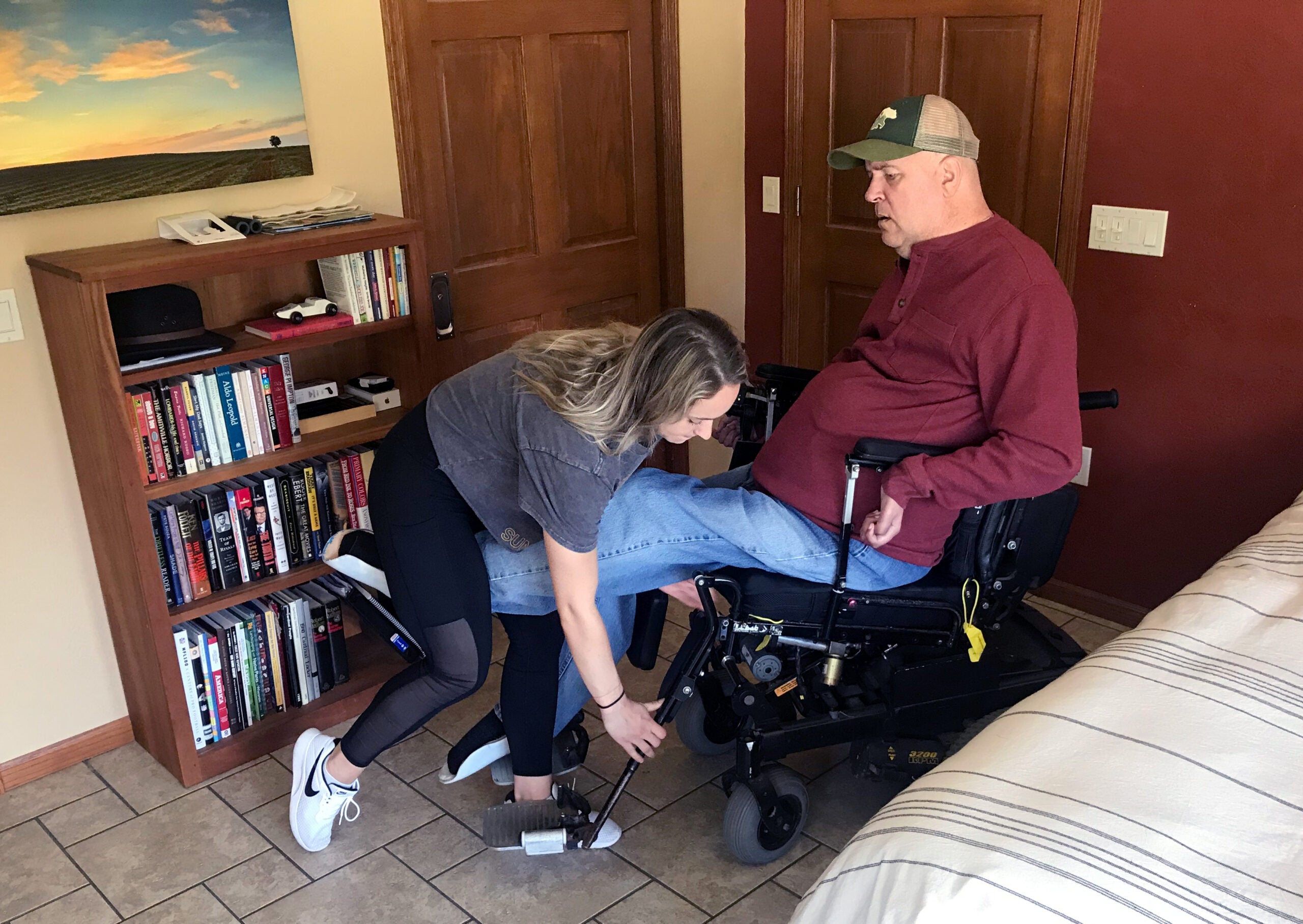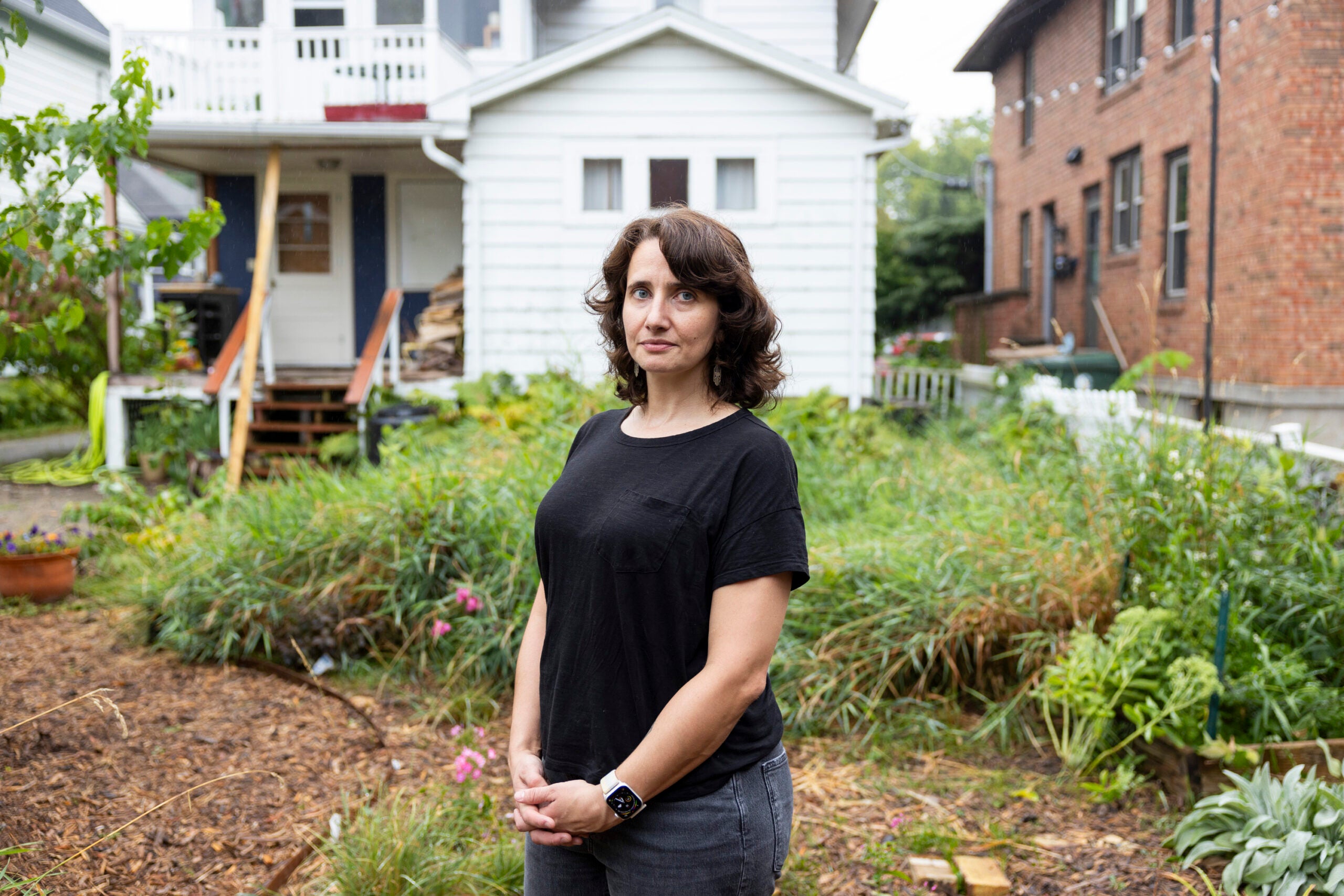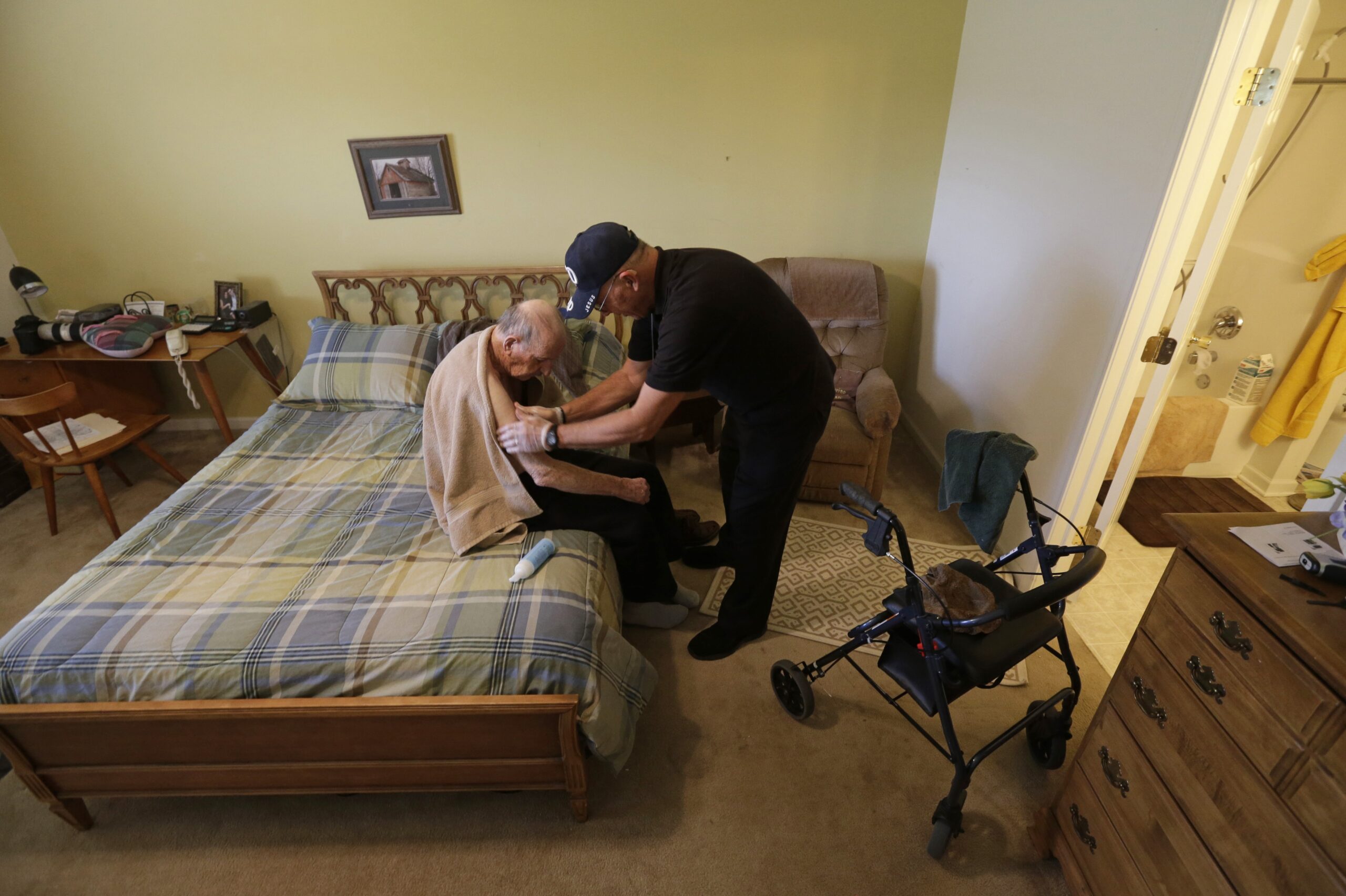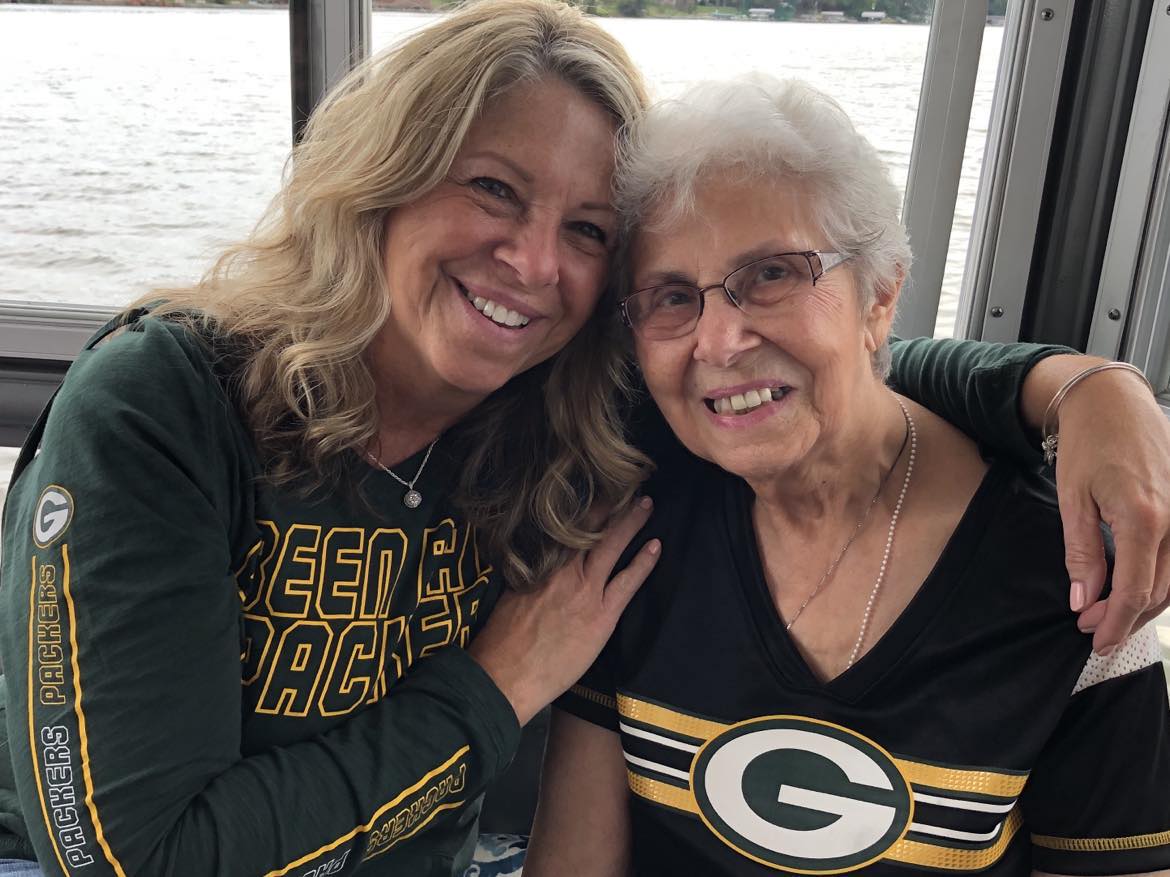When the COVID-19 pandemic hit, Stacy Ellingen of Oshkosh lost two of the three caregivers she depends on to dress, shower, eat and use the bathroom. The helpers — all University of Wisconsin-Oshkosh students — returned to their parents’ homes when the university canceled in-person classes.
Ellingen, 34, had little choice but to do the same — moving back to her parents’ home in Fond du Lac.
Matt Ford, 55, already lived with his 76-year-old father, his primary caregiver, in a specially designed house in Verona that includes a basement serving as living quarters. One of Ford’s other caregivers initially moved into that basement to guard against transmitting the virus to Ford.
Stay informed on the latest news
Sign up for WPR’s email newsletter.
Jason Endres asked his care workers to stay out of the home he shares with his wife Julie in Eau Claire. With masks hard to come by, Endres feared the caregivers could inadvertently spread the deadly virus, ravaging his lungs already weakened by a condition called spina bifida.
COVID-19 has infected at least 12,885 Wisconsinites, killed 467 and exposed vulnerabilities in health care systems, including those designed to serve the state’s elderly and disabled residents.
Before the pandemic, Gov. Tony Evers in 2019 created a state task force to address a chronic shortage of caregivers for the elderly and people with disabilities. A report released in February described a “crisis,” with 20,655 vacant positions in Wisconsin’s long-term and residential care facilities and an average workforce vacancy rate of nearly 26 percent for long-term and residential care providers.
More than 33,880 Wisconsinites with physical disabilities and intellectual/developmental disabilities require some level of care or support, the report said.
The pandemic is adding hurdles for Wisconsin residents with disabilities to find caregivers, who perform demanding work that typically pays about $12 an hour.
Clients and caregivers are weighing tough questions about how to keep each other safe during close interactions — if that’s even possible at a time when protective equipment runs scarce. Some caregivers have stuck around, others haven’t. Clients who lose their caregivers also lose a semblance of independence. And statewide momentum to loosen restrictions meant to manage the still-spreading virus is adding to their anxiety.
[[{“fid”:”1257781″,”view_mode”:”embed_portrait”,”fields”:{“format”:”embed_portrait”,”alignment”:”right”,”field_image_caption[und][0][value]”:”%3Cp%20dir%3D%22ltr%22%3E%3Cspan%20id%3D%22docs-internal-guid-be70a024-7fff-ad66-2db8-bbd1dcaa5fd0%22%3EAbby%20Tessmann%2C%20who%20has%20cerebral%20palsy%2C%20lived%20independently%20before%20the%20pandemic%20in%20an%20apartment%20in%20Madison.%20She%20moved%20back%20to%20her%20parents%E2%80%99%20home%20in%20Watertown%2C%20Wis.%2C%20after%20the%20COVID-19%20pandemic%20disrupted%20the%20caregiving%20services%20that%20she%20normally%20relies%20on.%26nbsp%3B%3C%2Fspan%3E%3Cem%3EPhoto%20courtesy%20of%20Abby%20Tessmann%3C%2Fem%3E%3C%2Fp%3E%0A”,”field_image_caption[und][0][format]”:”full_html”,”field_file_image_alt_text[und][0][value]”:”Abby Tessmann”,”field_file_image_title_text[und][0][value]”:”Abby Tessmann, pandemic, COVID-19, coronavirus”},”type”:”media”,”field_deltas”:{“1”:{“format”:”embed_portrait”,”alignment”:”right”,”field_image_caption[und][0][value]”:”%3Cp%20dir%3D%22ltr%22%3E%3Cspan%20id%3D%22docs-internal-guid-be70a024-7fff-ad66-2db8-bbd1dcaa5fd0%22%3EAbby%20Tessmann%2C%20who%20has%20cerebral%20palsy%2C%20lived%20independently%20before%20the%20pandemic%20in%20an%20apartment%20in%20Madison.%20She%20moved%20back%20to%20her%20parents%E2%80%99%20home%20in%20Watertown%2C%20Wis.%2C%20after%20the%20COVID-19%20pandemic%20disrupted%20the%20caregiving%20services%20that%20she%20normally%20relies%20on.%26nbsp%3B%3C%2Fspan%3E%3Cem%3EPhoto%20courtesy%20of%20Abby%20Tessmann%3C%2Fem%3E%3C%2Fp%3E%0A”,”field_image_caption[und][0][format]”:”full_html”,”field_file_image_alt_text[und][0][value]”:”Abby Tessmann”,”field_file_image_title_text[und][0][value]”:”Abby Tessmann, pandemic, COVID-19, coronavirus”}},”link_text”:false,”attributes”:{“alt”:”Abby Tessmann”,”title”:”Abby Tessmann, pandemic, COVID-19, coronavirus”,”class”:”media-element file-embed-portrait media-wysiwyg-align-right”,”data-delta”:”1″}}]]Every respondent to an April survey of nearly 500 Wisconsinites with disabilities and older adults said the pandemic had disrupted their caregiving service. While some of those disruptions overlap, a dozen interviews with people with disabilities, their family members and caregivers across Wisconsin reveal how the crisis has transformed each life in unique ways.
The COVID-19 pandemic sent Abby Tessmann, who has cerebral palsy, back to her parents’ place in Watertown, from the Madison apartment where she lived independently. In Brookfield, Julie Burish worries the out-of-work caregivers who normally assist her daughter, who has Down syndrome, will leave for more lucrative industries and never return. Sara MacDonald of Little Chute must now isolate herself from her 18-year-old daughter, who has a rare chromosomal disorder called Ring 22, after MacDonald returned to work at a hospital.
Help Is Hard To Find
Ellingen has navigated life from a power wheelchair since she was a child. That’s due to complications from cerebral palsy, which has also affected her fine motor skills. Using an enlarged keyboard and eye gaze system, Ellingen operates her design firm, Design Wheels, from her apartment in Oshkosh, where she lived independently before the pandemic. That computer setup is a key component of the independent life Ellingen has fought for — a tool and lifestyle she now lacks while living with her parents.
“I’m not able to do much work while I’m at my parents’,” Ellingen said in a 20-minute interview over Zoom. After years of using bulky communication devices to speak out loud, she now uses an app on her phone. She requested interview questions days in advance to offer enough time to enter responses in the app.
[[{“fid”:”1257786″,”view_mode”:”full_width”,”fields”:{“alt”:”Stacy Ellingen”,”title”:”Stacy Ellingen, COVID-19, coronavirus”,”class”:”media-element file-embed-landscape”,”data-delta”:”2″,”format”:”full_width”,”alignment”:””,”field_image_caption[und][0][value]”:”%3Cp%20dir%3D%22ltr%22%3E%3Cspan%20id%3D%22docs-internal-guid-d54c62c2-7fff-ddc5-1ed0-e7b4baef017e%22%3EStacy%20Ellingen%2C%2034%2C%20of%20Oshkosh%2C%20Wis.%2C%20has%20navigated%20life%20from%20a%20power%20wheelchair%20since%20the%20age%20of%202%20due%20to%20complications%20from%20cerebral%20palsy.%20When%20the%20pandemic%20struck%2C%20she%20lost%20two%20of%20the%20three%20rotating%20caregivers%20she%20depends%20on%20to%20dress%2C%20shower%2C%20eat%20and%20use%20the%20bathroom.%20That%20forced%20her%20to%20move%20in%20with%20her%20parents%20in%20Fond%20du%20Lac%2C%20Wis.%2C%20where%20she%20has%20less%20independence.%26nbsp%3B%3C%2Fspan%3E%3Cem%3EPhoto%20c%3Cspan%20id%3D%22docs-internal-guid-d54c62c2-7fff-ddc5-1ed0-e7b4baef017e%22%3Eourtesy%20of%20Stacy%20Ellingen%3C%2Fspan%3E%3C%2Fem%3E%3C%2Fp%3E%0A”,”field_image_caption[und][0][format]”:”full_html”,”field_file_image_alt_text[und][0][value]”:”Stacy Ellingen”,”field_file_image_title_text[und][0][value]”:”Stacy Ellingen, COVID-19, coronavirus”},”type”:”media”,”field_deltas”:{“2”:{“alt”:”Stacy Ellingen”,”title”:”Stacy Ellingen, COVID-19, coronavirus”,”class”:”media-element file-embed-landscape”,”data-delta”:”2″,”format”:”full_width”,”alignment”:””,”field_image_caption[und][0][value]”:”%3Cp%20dir%3D%22ltr%22%3E%3Cspan%20id%3D%22docs-internal-guid-d54c62c2-7fff-ddc5-1ed0-e7b4baef017e%22%3EStacy%20Ellingen%2C%2034%2C%20of%20Oshkosh%2C%20Wis.%2C%20has%20navigated%20life%20from%20a%20power%20wheelchair%20since%20the%20age%20of%202%20due%20to%20complications%20from%20cerebral%20palsy.%20When%20the%20pandemic%20struck%2C%20she%20lost%20two%20of%20the%20three%20rotating%20caregivers%20she%20depends%20on%20to%20dress%2C%20shower%2C%20eat%20and%20use%20the%20bathroom.%20That%20forced%20her%20to%20move%20in%20with%20her%20parents%20in%20Fond%20du%20Lac%2C%20Wis.%2C%20where%20she%20has%20less%20independence.%26nbsp%3B%3C%2Fspan%3E%3Cem%3EPhoto%20c%3Cspan%20id%3D%22docs-internal-guid-d54c62c2-7fff-ddc5-1ed0-e7b4baef017e%22%3Eourtesy%20of%20Stacy%20Ellingen%3C%2Fspan%3E%3C%2Fem%3E%3C%2Fp%3E%0A”,”field_image_caption[und][0][format]”:”full_html”,”field_file_image_alt_text[und][0][value]”:”Stacy Ellingen”,”field_file_image_title_text[und][0][value]”:”Stacy Ellingen, COVID-19, coronavirus”}},”link_text”:false,”attributes”:{“alt”:”Stacy Ellingen”,”title”:”Stacy Ellingen, COVID-19, coronavirus”,”class”:”media-element file-full-width”,”data-delta”:”2″}}]]Ellingen said she could not survive without caregivers to assist with her basic daily needs.
“Many times I’ve skipped meals, gone without using the restroom and slept in my wheelchair because I didn’t have a caregiver,” Ellingen said.
This is not the first time a lack of help has forced her to return to her parents’ home, but Ellingen worries the pandemic will wreak long-lasting damage to an already thin caregiving workforce.
Measuring the current damage is not easy.
Data on caregiving services takes months to flow to a major funder of services for people with disabilities, the state Department of Health Services, a spokeswoman said. And even that data may not clearly show how the pandemic is affecting supply and demand.
A May survey of 504 providers conducted by the nonprofit Survival Coalition of Wisconsin Disability Organizations showed rising costs and plunging revenues across the industry. Nearly 20 percent of surveyed businesses were unsure whether they would survive the pandemic.
In an ideal world, Ellingen said she would have six or seven caregivers to fill work shifts, but that hasn’t happened for years. Ellingen was down to three care workers at the pandemic’s outset, including the two UW-Oshkosh students who have since left town.
University students typically make up at least half of Ellingen’s workers; they rarely stay with her for more than a year.
[[{“fid”:”1257791″,”view_mode”:”embed_portrait”,”fields”:{“format”:”embed_portrait”,”alignment”:”right”,”field_image_caption[und][0][value]”:”%3Cdiv%3EAfter%20the%20onset%20of%20the%20COVID-19%20pandemic%2C%20Stacy%20Ellingen%2C%2034%2C%20lost%20two%20of%20the%20three%20rotating%20caregivers%20she%20depends%20on%20to%20dress%2C%20shower%2C%20eat%20and%20use%20the%20bathroom.%20That%20forced%20her%20to%20move%20in%20with%20her%20parents%20in%20Fond%20du%20Lac%2C%20Wis.%20An%20enlarged%20keyboard%20and%20eye%20gaze%20system%20allowed%20Ellingen%20to%20operate%20her%20design%20firm%20from%20her%20apartment%20in%20Oshkosh%2C%20Wis.%2C%20where%20she%20lived%20independently%20before%20the%20pandemic.%20That%20is%20not%20available%20at%20her%20parents’%26nbsp%3Bhome.%20Here%20Ellingen%20is%20seen%20before%20the%20pandemic.%20%3Cem%3EPhoto%20courtesy%20of%20Stacy%20Ellingen%3C%2Fem%3E%3C%2Fdiv%3E%0A”,”field_image_caption[und][0][format]”:”full_html”,”field_file_image_alt_text[und][0][value]”:”Stacy Ellingen”,”field_file_image_title_text[und][0][value]”:”Stacy Ellingen, COVID-19, coronavirus”},”type”:”media”,”field_deltas”:{“3”:{“format”:”embed_portrait”,”alignment”:”right”,”field_image_caption[und][0][value]”:”%3Cdiv%3EAfter%20the%20onset%20of%20the%20COVID-19%20pandemic%2C%20Stacy%20Ellingen%2C%2034%2C%20lost%20two%20of%20the%20three%20rotating%20caregivers%20she%20depends%20on%20to%20dress%2C%20shower%2C%20eat%20and%20use%20the%20bathroom.%20That%20forced%20her%20to%20move%20in%20with%20her%20parents%20in%20Fond%20du%20Lac%2C%20Wis.%20An%20enlarged%20keyboard%20and%20eye%20gaze%20system%20allowed%20Ellingen%20to%20operate%20her%20design%20firm%20from%20her%20apartment%20in%20Oshkosh%2C%20Wis.%2C%20where%20she%20lived%20independently%20before%20the%20pandemic.%20That%20is%20not%20available%20at%20her%20parents’%26nbsp%3Bhome.%20Here%20Ellingen%20is%20seen%20before%20the%20pandemic.%20%3Cem%3EPhoto%20courtesy%20of%20Stacy%20Ellingen%3C%2Fem%3E%3C%2Fdiv%3E%0A”,”field_image_caption[und][0][format]”:”full_html”,”field_file_image_alt_text[und][0][value]”:”Stacy Ellingen”,”field_file_image_title_text[und][0][value]”:”Stacy Ellingen, COVID-19, coronavirus”}},”link_text”:false,”attributes”:{“alt”:”Stacy Ellingen”,”title”:”Stacy Ellingen, COVID-19, coronavirus”,”class”:”media-element file-embed-portrait media-wysiwyg-align-right”,”data-delta”:”3″}}]]Ellingen’s life with her parents carries major and minor annoyances. She must go to bed when they do — much earlier than she would prefer — or be left with no one to lift her into bed. She is also beholden to her parents’ music, television and food preferences.
Still, Ellingen feels lucky; if not for her parents, she would likely live in a nursing home, part of a long-term care sector linked to at least 6 percent of Wisconsin’s COVID-19 diagnoses and more than 40 percent of deaths.
“That’s the last place anyone wants to be — especially during the pandemic,” Ellingen said.
Caregiver Makes Sacrifices
Ford also heavily recruits his caregivers from a local campus — the UW-Madison. He typically finds the most interest near the end of the spring semester, but not this year, since the pandemic sent students home early.
A diving accident in 1987 left Ford paralyzed in all four limbs. He needs help getting in and out of bed, preparing meals, using the bathroom and driving. His father provides most of that assistance, but two or three additional workers take shifts at his home.
A lifelong Dane County resident, Ford lists his caregiving positions on UW-Madison’s student job board, often using creative ways to draw attention.
[[{“fid”:”1257801″,”view_mode”:”full_width”,”fields”:{“format”:”full_width”,”alignment”:””,”field_image_caption[und][0][value]”:”%3Cp%3EMatt%20Ford%20is%20seen%20in%20Verona%2C%20Wis.%2C%20with%20his%20caregiver%20Grace%20Brunette.%20Ford%20needs%20help%20getting%20in%20and%20out%20of%20bed%2C%20preparing%20meals%2C%20using%20the%20bathroom%20and%20driving.%20His%20father%20provides%20most%20of%20that%20care%2C%20but%20two%20or%20three%20additional%20workers%20normally%20take%20shifts%20at%20his%20home.%20Brunette%2C%20who%20is%20finishing%20a%20physician%20assistant%20program%20at%20the%20UW-Madison%20School%20of%20Medicine%20and%20Public%20Health%2C%20spent%20the%20first%20two%20weeks%20of%20the%20pandemic%20living%20in%20Ford%E2%80%99s%20basement%20to%20help%20with%20his%20care.%20%3Cem%3EPhoto%20courtesy%20of%20Matt%20Ford%3C%2Fem%3E%3C%2Fp%3E%0A”,”field_image_caption[und][0][format]”:”full_html”,”field_file_image_alt_text[und][0][value]”:”Matt Ford and caregiver Grace Brunette”,”field_file_image_title_text[und][0][value]”:”Matt Ford, caregiver, Grace Brunette, COVID-19, coronavirus”},”type”:”media”,”field_deltas”:{“4”:{“format”:”full_width”,”alignment”:””,”field_image_caption[und][0][value]”:”%3Cp%3EMatt%20Ford%20is%20seen%20in%20Verona%2C%20Wis.%2C%20with%20his%20caregiver%20Grace%20Brunette.%20Ford%20needs%20help%20getting%20in%20and%20out%20of%20bed%2C%20preparing%20meals%2C%20using%20the%20bathroom%20and%20driving.%20His%20father%20provides%20most%20of%20that%20care%2C%20but%20two%20or%20three%20additional%20workers%20normally%20take%20shifts%20at%20his%20home.%20Brunette%2C%20who%20is%20finishing%20a%20physician%20assistant%20program%20at%20the%20UW-Madison%20School%20of%20Medicine%20and%20Public%20Health%2C%20spent%20the%20first%20two%20weeks%20of%20the%20pandemic%20living%20in%20Ford%E2%80%99s%20basement%20to%20help%20with%20his%20care.%20%3Cem%3EPhoto%20courtesy%20of%20Matt%20Ford%3C%2Fem%3E%3C%2Fp%3E%0A”,”field_image_caption[und][0][format]”:”full_html”,”field_file_image_alt_text[und][0][value]”:”Matt Ford and caregiver Grace Brunette”,”field_file_image_title_text[und][0][value]”:”Matt Ford, caregiver, Grace Brunette, COVID-19, coronavirus”}},”link_text”:false,”attributes”:{“alt”:”Matt Ford and caregiver Grace Brunette”,”title”:”Matt Ford, caregiver, Grace Brunette, COVID-19, coronavirus”,”class”:”media-element file-full-width”,”data-delta”:”4″}}]]”I just started putting in there: ‘Grass-fed, free-range quad needs help,’” Ford said with a chuckle. “Quad” is short for quadriplegic.
Grace Brunette noticed the listing as a UW-Madison senior in spring 2016.
“This guy seems funny,” Brunette remembered thinking. She has worked for Ford on and off since then.
When the pandemic struck, Brunette, who is now finishing a physician assistant program at the UW School of Medicine and Public Health, no longer felt comfortable splitting her time between her apartment and Ford’s house.
“He’s immunocompromised, his dad is 76,” she said.
She moved into Ford’s basement to minimize contact with outsiders, including her own family. The basement was designed specifically to accommodate a live-in aide, a need that seemed inevitable as Ford’s father ages.
After spending the entire first two weeks quarantining in Ford’s house, she now stays three nights a week.
Why stay during the pandemic?
“He only has one other caregiver. That would be really selfish of me to just say, ‘Sayonara, I’m going to go quarantine with my family,’ when he needs the help,” Brunette said.
Ford bristles at the thought that Wisconsinites may begin to take the pandemic less seriously after the Wisconsin Supreme Court last week sided with Republican legislative leaders in striking down Gov. Tony Evers’ “Safer at Home” order. In an amicus brief filed before the ruling, advocacy groups detailed increased risks of COVID-19 infection for the elderly and people with disabilities if the order were lifted.
“It does feel a little personal that no one is recognizing the efforts that we made as vulnerable people who need caregivers in and out of our homes, and the sacrifices that the caregivers made,” Ford said.
“I don’t want people to go out of business either,” Ford added, referencing arguments against Evers’ policy. “I do care about them. I have some empathy towards that. But I also don’t want to die.”
Ford is lucky Brunette is still around, but how long she will stay remains unclear during the public health crisis. Brunette was set to start clinical rotations for physician assistant school in June, which would have taken her out of Madison — making her unavailable to work with Ford. She stayed when those rotations moved online; a planned trip to Belize with her classmates was canceled.
For now, her next rotation is scheduled to begin in Rice Lake in August. Someone will need to fill Brunette’s shifts during the fall, typically among the hardest times for Ford to recruit student caregivers. Brunette said she is trying to help Ford find her replacement, but that has proved difficult and stressful.
Mask Shortage Leads To Tough Choice
Like many people with disabilities in Wisconsin, both Ellingen and Ford serve as de facto employers for their caregivers, meaning they are responsible for providing personal protective gear. They each get two boxes of gloves every month, paid for by the state’s Medicaid program, although Ford said he is struggling to get them from his supplier due to surging demands during the pandemic.
Masks are even tougher to find. A relative of Ellingen offered to sew some for her workers. Ford’s only supply sources: a doctor’s office, where he might sneak one or two out after routine appointments, and a neighbor with a carpet cleaning business. As businesses reopen across Wisconsin during the pandemic, advocates are calling for the state to prioritize caregivers in distributing protective equipment.
The Wisconsin State Emergency Operations Center has a limited supply of protective gear from the Strategic National Stockpile, but certain long-term caregivers — including “home health, personal care, and supportive home care providers” — may request that equipment only if a client has tested positive for COVID-19, according to guidance by the state Department of Health Services.
The lack of masks has not dramatically altered either Ford’s or Ellingen’s caregiving plans.
It is a different story for Jason Endres and his wife Julie in Eau Claire.
“It’s really one of the big reasons why we haven’t had anyone come into the home,” Endres said.
Without masks, the couple feel uncomfortable inviting even familiar workers into their home, considering that many of them visit multiple clients or other work sites.
“There’s so much COVID going around, that if I can control my own environment, that’s what I’m going to do,” he said.
[[{“fid”:”1257806″,”view_mode”:”embed_portrait”,”fields”:{“format”:”embed_portrait”,”alignment”:”right”,”field_image_caption[und][0][value]”:”%3Cp%20dir%3D%22ltr%22%3E%3Cspan%20id%3D%22docs-internal-guid-49e0be4a-7fff-0960-28dc-8e9528273d0f%22%3EJason%20Endres%20and%20his%20wife%20Julie%20live%20in%20Eau%20Claire%2C%20Wis.%20They%20both%20use%20power%20wheelchairs%2C%20and%20have%20asked%20their%20caregivers%20not%20to%20enter%20their%20home%20during%20the%20pandemic.%20With%20masks%20hard%20to%20come%20by%2C%20Endres%20fears%20caregivers%20could%20inadvertently%20spread%20the%20virus%2C%20ravaging%20his%20lungs%20already%20weakened%20by%20a%20condition%20called%20spina%20bifida.%20%3Cem%3EPhoto%20c%3C%2Fem%3E%3C%2Fspan%3E%3Cem%3Eourtesy%20of%20Jason%20Endres%3C%2Fem%3E%3C%2Fp%3E%0A”,”field_image_caption[und][0][format]”:”full_html”,”field_file_image_alt_text[und][0][value]”:”Jason Endres”,”field_file_image_title_text[und][0][value]”:”Jason Endres, coronavirus, COVID-19″},”type”:”media”,”field_deltas”:{“5”:{“format”:”embed_portrait”,”alignment”:”right”,”field_image_caption[und][0][value]”:”%3Cp%20dir%3D%22ltr%22%3E%3Cspan%20id%3D%22docs-internal-guid-49e0be4a-7fff-0960-28dc-8e9528273d0f%22%3EJason%20Endres%20and%20his%20wife%20Julie%20live%20in%20Eau%20Claire%2C%20Wis.%20They%20both%20use%20power%20wheelchairs%2C%20and%20have%20asked%20their%20caregivers%20not%20to%20enter%20their%20home%20during%20the%20pandemic.%20With%20masks%20hard%20to%20come%20by%2C%20Endres%20fears%20caregivers%20could%20inadvertently%20spread%20the%20virus%2C%20ravaging%20his%20lungs%20already%20weakened%20by%20a%20condition%20called%20spina%20bifida.%20%3Cem%3EPhoto%20c%3C%2Fem%3E%3C%2Fspan%3E%3Cem%3Eourtesy%20of%20Jason%20Endres%3C%2Fem%3E%3C%2Fp%3E%0A”,”field_image_caption[und][0][format]”:”full_html”,”field_file_image_alt_text[und][0][value]”:”Jason Endres”,”field_file_image_title_text[und][0][value]”:”Jason Endres, coronavirus, COVID-19″}},”link_text”:false,”attributes”:{“alt”:”Jason Endres”,”title”:”Jason Endres, coronavirus, COVID-19″,”class”:”media-element file-embed-portrait media-wysiwyg-align-right”,”data-delta”:”5″}}]]Endres, 45, has reason to be cautious, considering his spina bifida-linked scoliosis. Endres had rods inserted into his back as a teenager, but his spine remained somewhat crooked — weakening his lungs. COVID-19 attacks infected peoples’ lungs.
Jason and Julie, who has cerebral palsy, both use power wheelchairs in the ranch-style home built 16 years ago to accommodate their needs. Their decision to keep caregivers away has added challenges during the pandemic.
Take the task of changing bedsheets. While a worker might finish in a matter of minutes, the couple spends more than an hour.
“She would do it once a week,” Jason Endres said of one of the workers who helps the couple. “We’re lucky if we do it twice a month.”
Because of Jason’s lung deficiency, Julie goes inside when the couple shops for groceries. A local Walmart offers curbside pickup for groceries, but Jason said Julie must still enter the building to pick up their prescriptions.
And the Walmart’s time slots for picking up groceries are hard to come by, he said. Another nearby grocery store also offers pickup, but for a $7 fee.
“For a person on a fixed income, $7 could mean a lot,” he said.
‘Sometimes I Come Home And I Cry’
Interviews with Wisconsin caregivers suggest they have a shortage of work, even as people with disabilities struggle to find available help.
The pandemic prompted Rachel Ritter to stop working as an independent caregiver in the Fox Valley, and she does not know when she will feel comfortable enough to resume. She has spent 17 years as a caregiver — a labor of love, but a website design agency she owns with her husband generates most of her income.
“My husband always says, ‘I think you spend more money taking (caregiving clients) and doing things with them than you really earn,’” Ritter said.
Ritter, 35, has a tendency to get sick easily, and she and her husband are trying to start a family. Going in and out of other families’ homes seems risky until a coronavirus vaccine arrives, she said. Ritter is not sure what her future looks like.
Alec Watson, another independent caregiver, is trying to fill the caregiving void by picking up extra shifts around Eau Claire. He has doubled his hours during the pandemic, he estimates.
“It gets tiring having no days off at all,” Watson said in a recent interview after work. “Sometimes I come home and I cry and let it out.”
Watson is staying careful. When he comes home he tosses all of his clothes and masks in the washer and hops in the shower.
He is thankful for his partner, a former caregiver, and his mother, a current caregiver. Their emotional support gets him through tough days. But if Watson’s hectic schedule continues for several months, he worries of growing “completely burnt out.”
“But until that happens, these people need me, and I’m going to keep doing it,” Watson said.
Jennifer Felty plans to send roughly 80 caregivers back to work at Headwaters, Inc., the service provider agency she runs in northern Wisconsin. Many of her employees could be earning more through state and federal unemployment dollars than at work. Advocates have long called on Wisconsin leaders to improve wages and benefits for caregivers, even after the Legislature approved a rate increase through Medicaid last year.
But Felty said at least half of the caregivers she laid off earlier in the pandemic had yet to receive unemployment checks from the overwhelmed Wisconsin Department of Workforce Development.
“People are eager to come back to work,” she said.
Felty’s agency must rejuvenate its staffing levels to pre-pandemic levels by June 30 for the federal government to forgive a crucial loan under the Paycheck Protection Program.
“I am just really hopeful that we have enough services for (caregivers) to provide, because I’m not sure that we’re going to,” Felty said.
Living In Limbo
As the pandemic continues, a cloud of uncertainty hangs over the disabilities community.
Ellingen has lined up enough workers to return to her Oshkosh apartment for two weeks at the end of May. But she will likely need to rejoin her parents for most of June.
“Going back to Oshkosh is obviously a risk, but it’s necessary,” Ellingen said. “I don’t believe COVID is going away anywhere in the near future. So it’s something we’re going to have to learn to live with.”
Ford is searching for Brunette’s potential replacement. The demise of Evers’ stay-at-home strategy has prompted Ford to rethink the hiring interviews he typically conducts at home. He is contemplating whether he has enough masks to screen candidates in person, or whether he should move to video chats.
Uncertainty is eating Endres up inside.
“Are we going to live in this limbo for the rest of our lives? Is that going to be changing for the better or for the worse?” Endres said.
“I agree that we need to get the economy going. But safety’s got to be first.”
This story comes from a partnership of Wisconsin Watch and WPR. Bram Sable-Smith is WPR’s Mike Simonson Memorial Investigative Fellow embedded in the newsroom of Wisconsin Watch (wisconsinwatch.org), which collaborates with WPR, PBS Wisconsin, other news media and the University of Wisconsin-Madison School of Journalism and Mass Communication. All works created, published, posted or disseminated by Wisconsin Watch do not necessarily reflect the views or opinions of UW-Madison or any of its affiliates.




